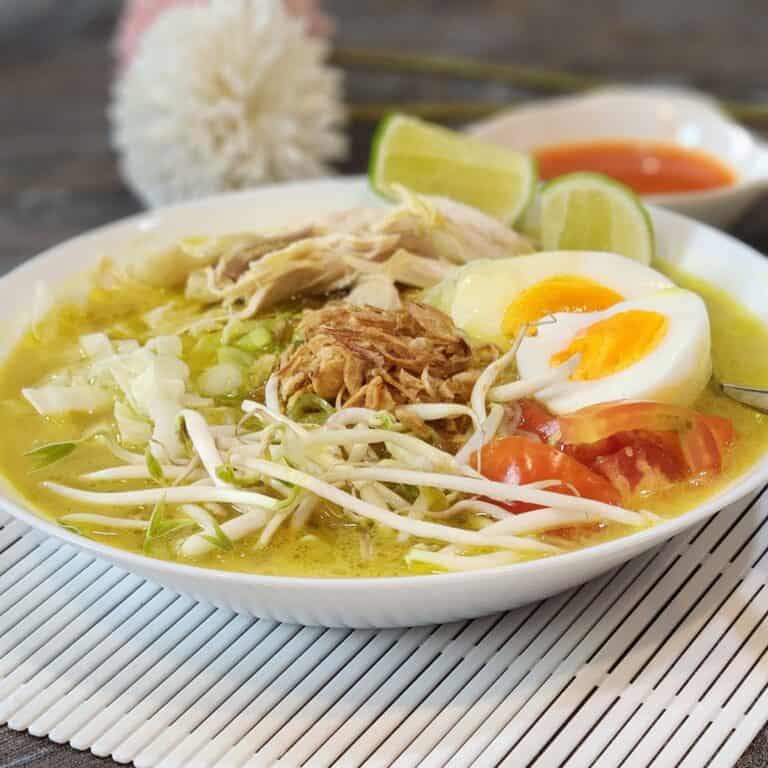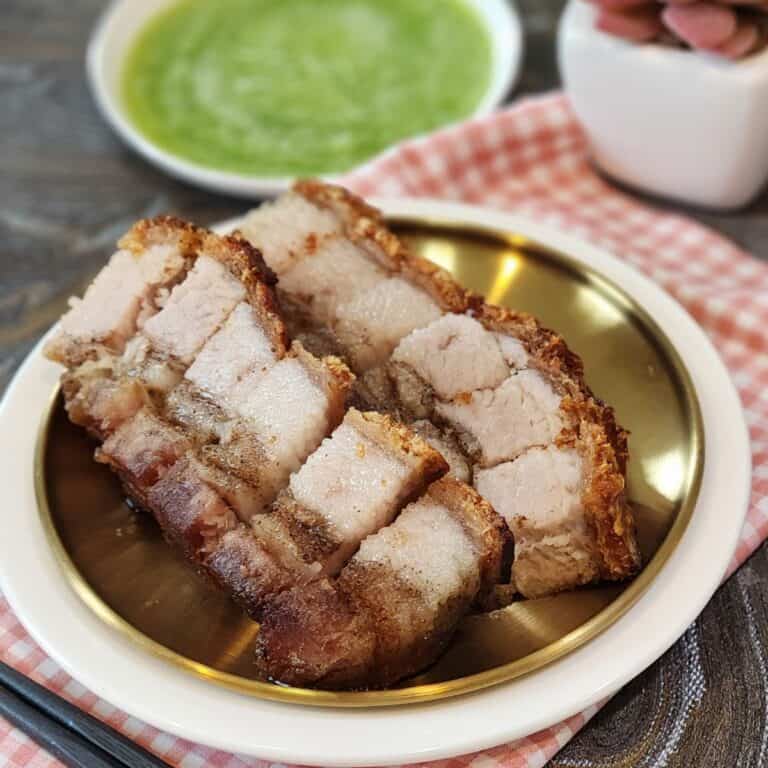Butterfly Pea Flower Tea
Bright, blue, and beautiful, this butterfly pea flower tea is as refreshing as it looks! Infused with lemongrass and pandan leaves, it’s the perfect caffeine-free drink to relax and unwind.

What Is Butterfly Pea Tea?
Butterfly pea flower is a small bloom that brews into a vivid blue tea, thanks to anthocyanins, the same plant pigments found in blueberries and purple cabbage. It has a light, slightly sweet, chamomile-like flavor and is naturally caffeine-free, perfect for relaxing any time.
I grow a few pots in my backyard with pandan leaves and lemongrass. I dry the petals for year-round use. Add a squeeze of lemon to turn the tea purple with a tangy twist, or stir in milk for a creamy Butterfly Pea Latte.
This blue tea also makes a natural coloring for treats like Kuih Seri Muka, Kue Lumpang, and Mango Sticky Rice. If fresh flowers aren’t available, powdered butterfly pea is a great alternative and widely sold online.
Tradition & Cultural Uses in Southeast Asia
Butterfly pea tea is popular across Southeast Asia, especially in Thailand, where it’s called nam dok anchan. It’s long been used as a drink and as a natural dye for rice dishes, desserts, and even textiles. In Malaysia, it colors nasi kerabu, while in Indonesia it’s used in cakes and layered sweets.
According to the Journal of Ethnopharmacology, the blue color comes from anthocyanins, which plants use to protect themselves from environmental stress. While some early studies have explored its antioxidant content and possible traditional uses, the evidence is still emerging, so the most magical thing about it might just be the way it brings a little science experiment to your teacup.
Why You Will Love This Recipe
Recipe Ingredients

Ingredient Notes
Butterfly Pea Flowers – Use either dried or freshly picked flowers; the flavor stays the same.
Pandan Leaves & Lemongrass – Fresh is best for aroma, but dried pandan leaves or lemongrass work well if that’s what you have.
Rock Sugar – I like using rock sugar for its gentle, mellow sweetness. Regular white sugar works too, just adjust the amount to suit your taste.
Be sure to check out the full recipe and ingredient list below
Variations
For a refreshing twist, swap lemon with orange or lime juice, both will still trigger the magical color change, but with a different citrusy flavor. Steep the tea with cinnamon sticks, star anise, or a slice of fresh ginger for a fragrant, spiced version that’s perfect for cooler days.
Butterfly pea tea also makes a stunning base for mocktails and cocktails. Mix the brewed tea with tonic water, lemonade, or sparkling soda for a fizzy non-alcoholic drink, or pair it with gin or rum for a vibrant party cocktail. The natural blue-to-purple transformation makes every glass stunning.
How to Make Butterfly Pea Tea


STEP 1. Rinse the pandan leaves and lemongrass. Trim into shorter pieces; lightly bruise the lemongrass and (optional) tie pandan into knots for easy straining. Add butterfly pea flowers, pandan, lemongrass, and rock sugar to a pot (Image 1).
STEP 2. Pour water into the pot (Image 2).


STEP 3. Bring to a gentle simmer over medium heat. Do not boil.
STEP 4. Once it reaches a simmer and the liquid turns deep blue and fragrant, turn off the heat and let it steep for 3–5 minutes.


STEP 5. Strain, let cool, then transfer to a clean bottle. Refrigerate.
STEP 6. To serve, add a slice of lemon—the tea will turn purple. Enjoy cold over ice (or warm, if you prefer).
Pro Tips
- Know Your Blues – Butterfly pea flowers aren’t the same as purple hibiscus or blue spirulina, even if the colors look similar. Each has its own flavor and properties.
- Fresh or Dried Works – Can’t find fresh pandan, lemongrass, or flowers? Dried versions work just as well and taste the same.
- Color Depth vs. Flavor – More flowers will give a deeper blue, but won’t make the tea taste stronger—so adjust the amount based on the color you want.
- Color-Changing Magic – Add a slice of lemon and watch it turn from blue to purple in seconds. The citrus also adds a tangy twist, so expect a change in both taste and color.
- Storage Tip – Keep the brewed tea in a sealed bottle in the fridge for up to a week to enjoy it chilled anytime.
- Clean Thoroughly – Wash pandan leaves and lemongrass well, especially near the roots where dirt tends to hide.
How to Serve
Serve this stunning blue tea alongside sweet treats like Salted Egg Yolk Pastry, Castella Pandan Cake, or chewy Ube Mochi Pancakes for a beautiful dessert pairing.
It’s also perfect with savory snacks such as Shrimp Balls, crispy Fried Meatballs, Pork Shu Mai, Gyoza, or golden Fried Wontons. The light, floral flavor of the tea balances out richer bites and makes the whole spread feel extra special.
FAQs about Butterfly Pea Tea
Yes, butterfly pea tea is naturally caffeine-free, making it a great choice for drinking in the evening or if you’re avoiding caffeine altogether.
The vibrant blue color comes from plant pigments called anthocyanins. When the tea’s pH changes, such as when you add lemon juice, it turns purple, and other acidic mixers can shift it to pink.
It has a mild, slightly earthy and floral flavor, often compared to green tea or chamomile. The taste is very subtle, so it pairs well with citrus, herbs, or spices.
Yes! You can use it as a natural food coloring for rice, desserts, drinks, and even baked goods. It’s popular in Southeast Asian dishes like nasi kerabu and colorful layered cakes.
Butterfly pea tea is enjoyed in many Southeast Asian households as a daily beverage. Like most herbal teas, it’s generally considered fine in moderate amounts.
In traditional Southeast Asian culture, butterfly pea tea is valued for its beautiful color and as a calming drink. Some studies have looked into its plant compounds, but research is still limited, and it’s mainly enjoyed for its flavor and appearance rather than proven health effects.

Storage
Store the tea in a sealed bottle in the refrigerator for up to 7 days. It stays fresh and flavorful chilled, and there’s no need to reheat, it’s best enjoyed cold.
More Refreshing Drinks Recipes
In many parts of Asia, tea is often brewed with herbs, leaves, and flowers for both flavor and aroma. Here are some delicious ones to try:
- Lemongrass Tea – Light and citrusy, perfect if you enjoy a clear, refreshing drink with a gentle lemongrass aroma. You might also love Lemon Ginger Drink for a cozy, soothing option on cooler days.
- Rose Milk Tea – A fragrant floral tea with creamy milk, perfect when you want a drink that feels like a little indulgence.
- Honey Oolong Milk Tea – Combines the floral fragrance and toasty depth of oolong tea with the natural sweetness of honey.
- Assam Milk Tea – Bold, creamy, and rich with a malty flavor that makes it perfect for strong tea lovers.

Butterfly Pea Flower Tea
Ingredients
- 30-50 pcs dried butterfly pea flower tea
- 3-5 stalk lemongrass
- 3-4 pcs pandan leaves
- 200 gr sugar use rock sugar
- 5 litre water
Instructions
- Wash clean the pandan leaves and lemongrass stalks. Cut them in shorter form.
- You can use either dried form of butterfly pea flower or the freshly picked ones. They are both the same and will generate the same amount of beautiful blue color and taste.
- Boil 5 liter of water in a pot. Put in the lemongrass stalks, pandan leaves, butterfly pea flowers, and rock sugar.
- Let it boil until the pandan leaves change colors.
- Sieve and let it cool completely.
- Transfer to a bottle and keep refrigerated for 3-5 days.
- Serve with ice cubes and/or lemon slices.
- Please note that when you put in some leomn slices, the color and taste will be different. It is up to your preference. Enjoy!
Video
Notes
- Butterfly pea flowers are different from purple hibiscus or blue spirulina, even though the color is almost the same.
- You can use dried pandan leaves, dried lemongrass stalks, and dried butterfly pea flowers if you can’t find the freshly picked ones. The flavors will be the same.
- The more flowers you brew, the darker the blue color. However, it will not effect the flavor of the tea.
- Add a slice of lemon and it will instantly give you magic. The color will be purple instantly and the flavor will be tangier. Please note that when you put in some lemon slices, the color and taste will be different.
- Chill the brewed tea in a bottle for up to one week. It stays fresh that way.
- Wash the pandan leaves and lemongrass stalk thoroughly, especially the part near the roots, they tend to carry some dirt.









You will fall in love with this floral tea! Its beautiful blue color with a hint of lemongrass and pandan leaves is not only pretty, but also refreshing!